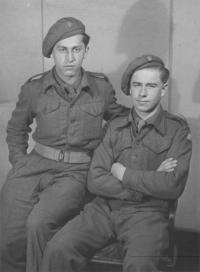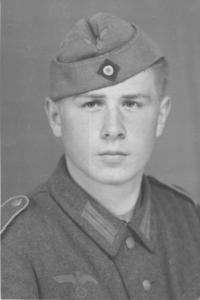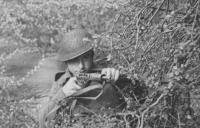“I heard a sound and looked out of the window. There he was! A German soldier stood there trying to connect it. Later we checked it and he’d only have to connect five meters and he’d have blown the whole thing up with me inside.”
Jan Sikora was born in Jablunkov in Silesia in 1925. Because of his Silesian nationality he was drafted to the Wehrmacht in Český Těšín and then left to Leipzig where he was assigned to the 115th infantry unit. He was supposed to leave for the eastern front but missed his train and so was relocated to Mannheim to the 215th battalion. His military training took place in Nancy, Metz a Creps. He was trained as a member of a heavy machine gun crew. After the end of his training, he left to Calais and later to other places on the northern shores of France where he was assigned to the units defending the coastline against the expected allied invasion. After the invasion in Normandy in June 1944, his unit withdrew to the interior of the country to block the advance of the allies. In July 1944, he was captured by the Americans near Paris and taken to a detention camp. He went to Britain, to the city of Southampton where he was trained and then he joined the supply company of the Czechoslovak armed brigade. He was deployed in the battles in France at the city of Dunkirk. After the war he helped to locate and repatriate Czechoslovak compatriots. In 1946, he was demobilized and returned home.



